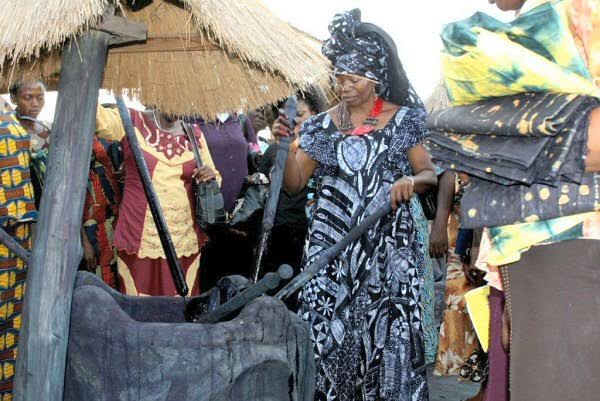BY YAKUBU USENI.
The exigence of history in our modern contemporary society cannot be over emphasized. On this note, it is expedient that the history of the Jukun people in the present Benue State should be reviewed.
The Jukun tribe comprises the different stocks. And the stocks are; Jukun-Wanu, Jukun-Wapan, Jukun-Kuteb, Jukun-Kona, Jukun-Kpanzon, Jukun-Tigon etc which are mostly found in the present day Taraba State. Juku-Gwana and Jukun-Hone from Bauchi State. Jukun-Pindiga and Jukun-Hone also from Gombe State. Jukun-Kyekura, Jukun-Garkawa and Jukun-Amper from Nasarawa and Plateau States respectively. The Jukun-Wanu and Jukun-Nyifon are predominantly found in Benue and Taraba States.
Historically, the Jukun claimed Descendency from Yemen in southern Arabia under the leadership of Agadu. They migrated and entered Africa after a brief stay in Egypt. The Jukun finally entered the present day Nigeria through the Kanem-Borno as early as (C 13th) thirteenth century. They founded Kwararafa Kingdom with its Headquarters at Biepi or APA. Thereafter, it was moved to Puje and finally, to Wukari under Katapka as the first Aku (Chief) Meek and Palmer (1931).
Above is the brief history of the Jukun. For the purpose of this narrative, I shall be focusing on the Jukun-Wanu of Benue State and their historical antecedents in the development of Benue State. The earliest migration of the Jukun-Wanu into what is today known as Benue State was from Idah Kingdom in about 1655 due to succession disputes at the Idah Kingdom. The anarchy which followed the struggle for the stool of Attah was one of the most important histories in the sixteenth century (C16th) in Kwararafa Kingdom because, it was said to have caused en masse north Western migration of the Jukun and JUKUN related groups to settle where they are presently found.
The Jukun-Wanu in Benue State are predominantly fishermen. They belong to the large family of Kwararafa Kingdom. Their migration into their present locationin Benue Valley now Benue State in the periods under review, was in search for food and shelter (Greener pastures) as a result of collapse of the Kingdom mostly in groups as clans, lineages and royal houses looking for new areas for settlements
The migration of the Jukun-Wanu into the areas led to the establishment of Towns and Villages such as; Abinsi, Azhoko, Abweni, Andosede (Gbajimba), Anuwha, Akuzu, Agbudu, Anyishi up to Ibi in present day Taraba State. Apart from Ibi, all other Towns and Villages are in Guma Local Government area of Benue State under the jurisdiction of Abinsi District with a significant population of the Jukun-Wanu people. In Makurdi Local Government Area, Towns and Villages of the Jukun-Wanu are and not limited to, Agyogo which part of is known as (wurkum) and one of the first Towns and Villages in Makurdi the Benue State Capital, Anmor which also houses Makurdi Air Port Base, New Garage an extension of Agyogo Town all in southern Bank of River Benue. At the Northern Bank of River Benue, we have North bank, Agyetashi (Clark Quarters), Ajiwo and several others with a chunk population of the Jukun-Wanu people.
The Towns and Villages mentioned above according to Maddocks, existed before the arrival of the Tiv into the Benue valley Maddocks 1929 and 1935).
According to Maddocks, these Jukun-Wanu settlements which are mostly close to the Bank of Rivers Benue and katsina-Ala were founded by the Jukun-Wanu Chiefs and their followers. These settlements were founded before the arrival of the Tiv in the Benue valley in about C 18th (Eighteenth century). Makar corroborates this fact that, “the Tiv arrived Benue Valley when Jukun and Chamba powers were already on the decline” Makar (1994. P 59). Equally important to note is that, before the advent of the colonial rule and their administration, all the Jukun-Wanu Chiefs received their appointment, confirmation and coronation from the Aku Uka of Wukari who was and still regarded as the highest spiritual Head of the entire Jukun kingdom including the Tiv Nation. However, the creation of Tiv division out of Wukari confederation, some of the Jukun-Wanu settlements from Anyishi town to Igyaha fall within the Tiv division. Despite these changes, Abinsi a Jukun-Wanu Town was still the Headquarters of the newly created Tiv Division before it was finally moved to Gboko in 1934. At that time, Captain Downes was the British Administrator in charge of the area. Worthy of note is that, the office of the Tor Tiv was created in 1945 and two years later, 1947 Ochivirigh Makir Dzakpe, a retired Army Sergeant was appointed the first Tor Tiv. With this new arrangement, the Chiefs of the Jukun-Wanu settlements within the Tiv Division came under the jurisdiction of the Tor Tiv and no longer Aku Uka as was the practice.
As earlier noted, Jukun-Wanu are predominantly fishermen. Their settlements as dictated by the nature of their occupation, were and are at the river bank, where they carry out their fishing business and other riverine related activities. The Tiv either ways are predominantly farmers living in hinterland farming. As earlier stated, the arrival of the Tiv in Benue Valley especially the the Ihyarev, Nongov and Massev units of the Tiv, met the Jukun-Wanu already settled for quite a long time and they facilitated the movement and crossing over to the other side of River Benue some of the Tiv factions that are today found in Awe, Keana, Obi and other Tiv settlements in Nasarawa and Plateau States where they also claim indigenes. Dewar’s reports on the riverine Jukun substantiate that, the arrival of the Utyiondu Tiv was well received by the Jukun-Wanu of Abinsi and ferried across the river Benue at the Abinsi axis the Utyiondu leader, Agiri and his followers to the their present location. While the Jukun-Wanu of Anmor facilitated the Isheriv and Nyiev the sections of the Ihyarev Tiv section to their present site. Maddocks (1935). During this period Asemanya noted that, “some Tiv groups that moved to the confluence of the katsina-Ala River near the present day Anyishi (Anyebe) a Jukun-Wanu settlement, were paddled across the other side of the River Benue. In fact, most if not all of the Tiv living in Awe, Keana, Doma and Lafia had their ancestors paddled across the river Benue by Jukun-Wanu. It would have been a herculean task for the Tiv to cross the River Benue to the other side in the late C18th (eighteenth century) and early C19th (nineteenth century) if the Jukun-Wanu were not on ground in the already mentioned Jukun-Wanu settlements above with their already strongly organized traditional institutions unlike the Tiv who did not have traditional institutions at all neither the idea until their coming in contact with the Jukun they began to learn the act and subsequently, the Tiv Native Authority (NA)was created in 1929” (Asemanya 2018. 2 19). The Jukun-Wanu has their well organized traditional institutions. Each of the Jukun-Wanu settlement Town has an independent Aku (Chief) which are all answerable to Aku Uka of Wukari. In some cases, the Jukun-Wanu Chiefs present their Tiv visitors to the Aku Uka of Wukari for the title of Tor-Ugbanda (Chief drummer) because the act was also learned from the Jukun-Wanu. During this period, Maddocks noted that Utyiondu leader Agiri was presented by the chief of Abinsi to Agbu Manu the Aku Uka of Wukari for the confirmation of the title of Tor-Ugbanda. (Maddocks 1935).
THE ORIGIN OF THE WORD “BENUE”.
The word BENUE is a derivative of the Jukun-Wanu phrase “beni whe” meaning come with me. This is anchored on the fact that the wave of migrations of the Jukun people especially the Jukun-Wanu was not done simultaneously. For instance, the group of Jukun-Wanu that first arrived what is today known and called Abinsi are the Azhoko people. Seeing that, the other units beaconed on their colleagues to come with them to stay with their brothers who have already settled their and on the river bank hence the word Benue. This had been for over 200 years before the arrival of the Tiv in Benue Valley and the fact that the view is still popular among the Jukun-Wanu people cannot be disputed. To substantiate this assertion, Meek and Palmer the German anthropologists who voyage round Benue valley and studied the history of the Jukun-Wanu of Benue valley asserted that when he arrived Abinsi and other Jukun-Wanu settlements within the Benue valley in the 1900, the view had already gained prominence among the Jukun-Wanu people (Meek and Palmer 1931). This therefore means that the view is subject to scholarly argument and not the innovative ideas on the minds of the thinkers.
MARGINALISATION AND DEPRIVATION OF JUKUN-WANU IN BENUE STATE.
Behind every crisis anywhere in the world is INJUSTICE and the solution to the crisis JUSTICE. Despite the injustice melted out to Jukun-Wanu in Benue State over the years, they will never and can ever go to war with any one but continue to pursue a civilized way to address their grievances which include engaging in diplomatism and seek legal redress where it is necessary. The Jukun-Wanu of Benue State, despite their existence and their historical antecedents in Benue State, still suffers the worst marginalisation and deprivation ever experienced anywhere in the world but still remained calm and resolute believing in the natural order of things ordained by the Supreme Controller of the Universe (God).
The Jukun-Wanu are spread over two local governments of Makurdi and Guma in Benue State with a significant population and a colossal contributions to the successes of the successive Governments in Benue State but still cannot be given the opportunity to be chairmen of the two local governments of Makurdi and Guma where they are domiciled, neither are they given the opportunity to represent their people in the Benue State House of Assembly.
Since Nigeria’s transition from military to civilian rule in 1999, successive governments in Benue State have not adequately favour the Jukun in Benue State. For instance the Akumas 8years as Governor of Benue State, only Oliver Atama from Abinsi was appointed SA to Governor on Land and Survey till his administration ended and ushered in the administration of Torwua Suswam. Suswam’s administration did not favor the Jukun-Wanu in Benue State, the modus operandi of Suswam’s regime was better described as the principle of “who knows who”. It was on that premise that Gadafe Asemanya was appointed SA to the Governor on public utilities not because he is Jukun-Wanu, it was thereafter that, he was discovered to be Jukun-Wanu. Ortoms first administration gave Jukun Wanu in Benue State a sight of relieve when three of Jukun-Wanu Sons namely; Innocent Abayilo, Kefas Aseshi (Bakassi) and Dauda Ubandoma SAs of Chieftaincy Affairs, Community Relations and Land Matters respectively. Jukun-Wanu in Benue State hopes that the second tenure of Ortoms administration, he will do more by extending his hands of fellowship to include the Jukun-Wanu in Makurdi Local Government for political appointments. But this is not enough, Jukun-Wanu in Benue State deserve more than they have gotten politically.
On the traditional institutions, the Jukun-Wanu of Benue State are most disadvantaged prior to and subsequently, the creation of Benue State in1976 till date, successive Chieftaincy laws of Benue State are always to the disadvantage of the Jukun-Wanu in Benue where its force them to recognize and imbibe the culture and tradition of Tiv people despite the recommendations of the panel of Inquiry into the crises between Tiv and Jukun in Abinsi as contained in white paper. The paper recommended among several other things, the creation of Jukun Chiefdoms since they do not have cultural similarities with the Tiv. Till date the recommendations have been not been implemented for whatever reason,only God knows which in my opinion, it is an act of neocolonialism in the 21st century.
In view of the historical antecedents of the Jukun-Wanu people in Benue State as painstakingly enumerated above, is it logical to refer to the Jukun people of Benue State as settlers and strangers in Benue land as postulated by some traditional and political leaders in Benue State? Well, only the discerned minds can answer this question. I would like the whole world reading this article not to look at it as rhetorics of social media but the merits of the issues raised in it which many might not be aware of. I believe in one Nigeria, I believe in mutual and peaceful coexistence.
REFERENCES1.Joshua Asemanya,( 2018)” The Jukun of Abinsi:A Social-Political History. Aboki Publishers Makurdi.
- CK Meek and Palmer, (1931)”The Sudanese Kingdom, London: Kegan press.
3.Tesemchi Makar(1994). “The History Of Political Change Among The Tiv in the 19the and 20th Century”. Fourth Dimension Press Ltd. Enugu.
4.KP Maddocks(1935).”Abinsi Town and it Environs,Tiv Division Benue Province Intelligence Report No. 221822″.






